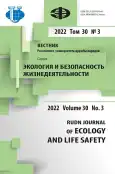Ecological reflection and its verbalization in the Russian, English and French media discourse space: a comparative approach
- Авторлар: Guslyakova A.V.1,2, Guslyakova N.I.3, Valeeva N.G.1
-
Мекемелер:
- Peoples’ Friendship University of Russia (RUDN University)
- Moscow State Pedagogical University
- South Ural State Humanitarian Pedagogical University
- Шығарылым: Том 30, № 3 (2022)
- Беттер: 428-440
- Бөлім: Environmental education
- URL: https://journal-vniispk.ru/2313-2310/article/view/323992
- DOI: https://doi.org/10.22363/2313-2310-2022-30-3-428-440
- ID: 323992
Дәйексөз келтіру
Толық мәтін
Аннотация
The article covers the problem of ecological reflection and the ways of its linguistic realization in the Russian and foreign media discourse space at the present epoch of digitalization and sustainable development. The main goal of this research is to characterize the key linguistic ways of expressing ecological reflection at its individual and collective levels of information perception by human consciousness in Russian, English and French media discourses. The study contains a comparative approach towards the analysis of the language units that express ecological reflection in the media discourses of different language domains. This method helps define the relevance of the study, which is primarily explained by the increasing number of interactive media materials focused on the environmental issues of the third millennium. The results of the study demonstrate a different degree of the language expression of ecological reflection (evolutionary, mediative and radical) by means of a particular choice of linguistic instruments specific for a certain language media space. In the end, one common principle is identified in the expression of ecological reflection in the Russian, French and English media discourse space. Despite almost opposite linguistic approaches towards the implementation of ecological reflection in the Russian, English and French media, there is one common challenge that unites them all, and this is the survival of the planet as well as its further sustainable development. Thus, at this stage the language choice for the promotion of eco-reflective ideas becomes convergent for three media discourse space of Russia, France and the English-speaking world.
Негізгі сөздер
Авторлар туралы
Alla Guslyakova
Peoples’ Friendship University of Russia (RUDN University); Moscow State Pedagogical University
Хат алмасуға жауапты Автор.
Email: aguslyakova@bk.ru
PhD in Philology, Associate Professor of the Department of Foreign Languages, Institute of Environmental Engineering, Peoples’ Friendship University of Russia (RUDN University) ; Associate Professor of the Department of Contrastive Linguistics, Institute of Foreign Languages, Moscow State Pedagogical University 6 Miklukho-Maklaya St, Moscow, 117198, Russian Federation; 1 Malaya Pirogovskaya St, bldg 1, Moscow, 119435, Russian Federation
Nina Guslyakova
South Ural State Humanitarian Pedagogical University
Email: guslyakovani@cspu.ru
Doctor of Sciences (Psychology), Professor of the Department of Technology and Psychological and Pedagogical Disciplines, Faculty of Science and Technology 69 Lenina Prospekt, Chelyabinsk, 454080, Russian Federation
Nailya Valeeva
Peoples’ Friendship University of Russia (RUDN University)
Email: valeeva-ng@rudn.ru
PhD in Pedagogics, Professor, Head of the Department of Foreign Languages, Institute of Environmental Engineering 6 Miklukho-Maklaya St, Moscow, 117198, Russian Federation
Әдебиет тізімі
- Scolari CA. Media Ecology: Exploring the Metaphor to Expand the Theory. Communication Theory. 2012;(22):204-225.
- Postman N. The reformed English curriculum. In: Eurich AC. (ed.) High school 1980: The shape of the future in American secondary education. Pitman Publishing Corporation; 1970.
- Postman N. Five things we need to know about technological change. Talk delivered in Denver; 1998. Available from: https://web.cs.ucdavis.edu/~rogaway/classes/188/ materials/postman.pdf. Accessed: July 30, 2022.
- James W. The principles of psychology (Vol. 1). New York: Dover; 1981/1890. Available from: http://www.public-library.uk/ebooks/50/61.pdf (аccessed: 12.07.2022).
- Farthing GW. The Psychology of Consciousness. Englewood Cliffs, NJ: Prentice Hall; 1992.
- Novacikova D. Environmental issues and reflection of their perception in internet media. Communications. 2017; 1:30-34.
- Buttel FH. Reflections on the potentials of ecological modernization as a social theory. Natures Sciences Sociétés. 2000;8(1):5-12. Available from: https://www.nss-journal.org/articles/nss/pdf/2000/01/nss20000801p5.pdf (аccessed: 12.07.2022).
- Oborsky V. We are engaged in environmental education wherever the company is represented. Vedomosti. Ecology. 2022;5(7) (In Russ.). Available from: https://cdn5.vedomosti.ru/application/2022/5m/rclby/original-zg1.pdf (аccessed: 12.07.2022).
- Spirkin A. Consciousness of the World and the World of Consciousness. In Dialectical Materialism. Progress Publishers; 1983. Available from: https://www.marxists.org/ reference/archive/spirkin/works/dialectical-materialism/ch03-s03.html (аccessed: 12.07.2022).
- Vygotsky LS. Collected works: in 6 volumes. Volume 2. Problems of General Psychology; 1982. (In Russ.).
- Vygotsky LS. Selected psychological studies. Moscow: Publishing House of the Academy of Pedagogical Sciences of the RSFSR; 1956, p. 267-269. (In Russ.).
- Khlebda V. Six considerations on the issue of linguistic self-awareness. In: Russian Studies: The Linguistic Paradigm of the Late 20th Century: collection of articles in honor of Professor S.G. Ilyenko. St. Petersburg: Publishing House of St. Petersburg State University; 1998. p. 62-67. (In Russ.).
- Vepreva IT. Language reflection in the post-Soviet era. Yekaterinburg: Urals University Press Publ. 2002. p. 63. (In Russ.).
- Krysin LP. Sociolinguistic aspects of the study of the modern Russian language. Moscow; 1989. p. 26. (In Russ.).
- Overall motivation [Internet]. Available from: https://www.overallmotivation.com/ quotes/jackie-kennedy-quotes/ (аccessed: 29.07.2022).
- Editorial: There’s little time left to save Earth from climate catastrophe. What U.S. politicians can do now. Los Angeles Times. April 8, 2022. Available from: https://www.latimes.com/opinion/story/2022-04-08/us-climate-action-end-fossil-fuels (аccessed: 14.07.2022).
- Man and nature: indestructible relationship, constant interaction. Komsomolskaya Pravda. Available from: https://www.kp.ru/guide/chelovek-i-priroda.html (аccessed: 12.07.2022). (In Russ.).
Қосымша файлдар









